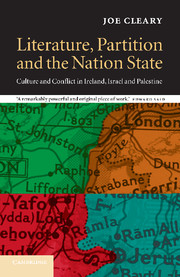Book contents
- Frontmatter
- Contents
- Acknowledgements
- Introduction
- Part I
- Part II
- 3 ‘Fork-tongued on the border bit’: partition and the politics of form in contemporary narratives of the Northern Irish conflict
- 4 Agonies of the potentates: journeys to the frontier in the novels of Amos Oz
- 5 The meaning of disaster: the novel and the stateless nation in Ghassan Kanafani's Men in the Sun
- Notes
- Index
4 - Agonies of the potentates: journeys to the frontier in the novels of Amos Oz
Published online by Cambridge University Press: 22 September 2009
- Frontmatter
- Contents
- Acknowledgements
- Introduction
- Part I
- Part II
- 3 ‘Fork-tongued on the border bit’: partition and the politics of form in contemporary narratives of the Northern Irish conflict
- 4 Agonies of the potentates: journeys to the frontier in the novels of Amos Oz
- 5 The meaning of disaster: the novel and the stateless nation in Ghassan Kanafani's Men in the Sun
- Notes
- Index
Summary
The decisive Jewish victory in 1948 left Israel in control of some 73 per cent of the land of Palestine (54 per cent was originally awarded in the United Nations Partition proposal). When Egypt and Jordan annexed Gaza and the West Bank respectively, Palestine was effectively expunged from the map, the entire territory absorbed into other states by way of a trilateral partition. Just twenty years later, however, the State of Israel secured control over the remaining Palestinian territories in the 1967 War. This effectively reunited, militarily at least, the sundered territory. For Israelis, the consequences of the 1967 victory were manifold and complex. The capture of Jerusalem and the seizure of the ‘lost’ Biblical territories of Judea and Samaria (the West Bank) revived the prospect that a ‘Greater Israel’, that would include all of historic Palestine, might now be realised. In the decade before 1948, the Zionist leadership had conceded that this maximalist goal was unattainable, but partition was reluctantly accepted, and the ambition that a ‘Greater Israel’ might one day be attained was never entirely abandoned. Even after its victories in 1948, Israel never committed itself to the boundaries agreed in the 1947 UN Partition Plan or to the borders agreed in the 1948–9 armistice agreements with the Arab states. The major difficulty attaching to a full annexation of the Palestinian territories captured in 1967, and to the immediate declaration of a ‘Greater Israel,’ however, was that this would have incorporated an additional 1.3 million Palestinian Arabs within what was defined as a Jewish state.
- Type
- Chapter
- Information
- Literature, Partition and the Nation-StateCulture and Conflict in Ireland, Israel and Palestine, pp. 142 - 185Publisher: Cambridge University PressPrint publication year: 2001

